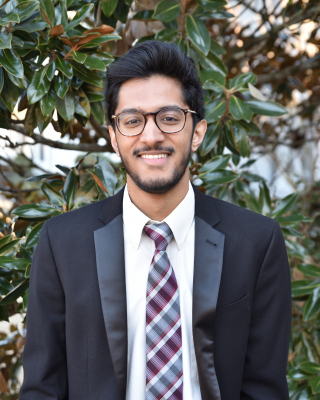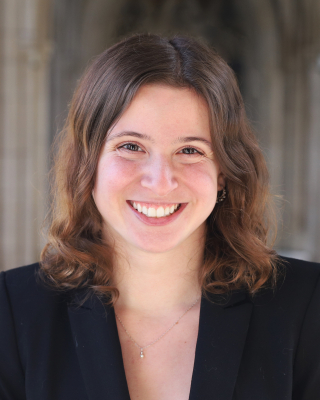Christian Jones
The Jerome S. Bruner Award for Excellence in Undergraduate Research is presented each year to an undergraduate Psychology major who exemplifies “excellence in intellectual curiosity with emphasis on research experience and potential for future scholarly activity.”
This academic year, two graduating seniors — Pranav Athimuthu and Anna Greenleaf — have been selected to receive the honor, the highest award that can be presented by the department to undergraduate researchers.
Pranav Athimuthu, a Psychology and Political Science double major from the suburbs of Atlanta, has consistently modeled the attributes of a Bruner award-winner during his time at Duke.
Athimuthu is intrigued by the ability of psychology to decode human behavior, particularly in politics. His research has taken him down numerous paths, including better understanding the link between religion and emotions, studying human perception of visual phenomena and helping citizens better engage with democracy.

As a high school senior admitted to Duke, Athimuthu visited the campus and had the opportunity to sit in on Bridgette Hard’s flagship Psychology 101 class. Although he was unsure of his declared major at the time, Athimuthu was struck by the enthusiasm of Hard’s lecture style and how engaged the students were, even in the final days of the spring term.
“I knew that if I chose to pursue Psychology as a major, I would receive support, community and the collaborative environment necessary for my success,” Athimuthu stated proudly.
Athimuthu’s combined curiosity about why people do what they do, what’s it’s like to exist in the human condition and his passion for politics led him to become an interdisciplinary researcher. Professor of Psychology & Neuroscience Scott Huettel’s Fundamentals of Decision Science course helped answer the call of Athimuthu’s curiosities, leading him to pursue a Decision Science Certificate, which focuses on quantitative ways to analyze behavior.
Another source of academic inspiration for Athimuthu was Chris Johnston’s political science course Political Psychology.
“Political Psych caused me to realize how psychology is present everywhere, including government,” Athimuthu said.
Additional research from Athimuthu includes a project through the Sanford School of Public Policy studying the impact of cash bail policies in North Carolina, as well as the Bass Connections project Social Provision of Information for Effective Democratic Citizens, which studies empirical ways to create critical consumers of news.
“During my time at Duke, I wanted to answer questions outside of a lab setting, so that I could interact directly with people and tell their stories beyond the data,” Athimuthu said. “I was confident that a mix of qualitative and quantitative methods could better help diagnose pitfalls in our political system, such as the barriers people of certain identities face when interacting with institutions, or how people choose which issues to care about, which allows psychologists to design interventions geared towards making their lives easier.”
Athimuthu also served as the former president of Duke’s Spoken Verb slam poetry organization, where he works with other poets on campus to make space for the discussion and expression of marginalized identities. He is a member and former president of the Visions of Freedom LLC, Duke’s living group for upperclassmen interested in politics, and has hosted events and cotaught a course allowing students to challenge their own viewpoints and interact with faculty.
Athimuthu’s leisure activities also allow him to apply his research skills to great use within the community. He enjoys writing and is currently co-editor in chief of “The Archive,” the university’s oldest undergraduate literary magazine, and he engages with the arts as an outlet, having created an audio documentary about conservation during his time as a volunteer at the Duke Lemur Center.
After graduation, Athimuthu is interested in obtaining a JD and Ph.D. But before that, he plans to explore his options in sectors that will allow him to sharpen his research skills in the world. Athimuthu confidently notes, “I desire real-world experiences and opportunities that expand my learning beyond the academy.”
Anna Greenleaf, a double major in Psychology and minoring in Photography, has consistently grown during her four years at Duke, and that journey consists of various snapshots of what it takes to become an outstanding researcher.
A native of New York City, Greenleaf arrived on Duke campus as a freshman with a grand curiosity about human behavior and even bigger aspirations to engage in research.
“One of the reasons I chose Duke is because of the resources and environment the university offers to scholars interested in research,” she said.

Greenleaf’s early interest in human behavior resulted in more than three years of research experience in several Duke labs exploring group dynamics, human decision-making and clinical psychology, with the ultimate objective of examining the impact of mental health conditions on prosocial behaviors in the workplace.
Greenleaf’s curiosity about motivators for collective action in combatting climate change led her to join the Duke Sociological Study of Cooperation Lab led by Ashley Harrell, assistant professor of Psychology & Neuroscience. Greenleaf’s research, rooted in understanding the impacts of unequal access to resources, further inspired her to investigate a new hypothesis during her junior year: Would the presence of resource inequality make it less likely that a chain of paying it forward would start and continue?
This research question provided new insight into how income inequality can harm individual and collective wellbeing. In 2022, Harrell and Greenleaf coauthored a paper on the findings published in the journal “Social Science Research.”
Greenleaf was one of three Duke students selected to present their research at the 2022 ACC Meeting of the Minds, a conference that celebrates undergraduate research and provides an opportunity for sharing ideas and collaboration.
“I felt so honored to be selected to represent Duke and present this work at the conference,” she said.
In her final year at Duke, Greenleaf achieved another publication milestone as a coauthor of a study from Associate Professor of Psychology & Neuroscience Zachary Rosenthal, published in “Frontiers in Psychology.” The paper explored under-researched mental health conditions such as misophonia, a condition in which certain sounds, such as chewing, trigger negative emotional reactions. In addition to Greenleaf’s studies with Rosenthal at the Center for Misophonia and Emotion Regulation, she also studied the implementation of trauma-informed teaching and learning at Duke, which was completed as part of a Bass Connections team.
Greenleaf expressed her gratitude to her mentors, including Harrell, Rosenthal and Stephanie Hargrove, assistant professor in psychiatry and behavioral sciences –– each of whom trusted in her, supported her and spent time and care teaching her the necessary skills to become a researcher.
“I came to Duke as a first-year student wanting to be involved in research, but I had no prior experience” Greenleaf said. “In addition to taking me under their wings, my mentors –– especially Dr. Harrell –– have each cared for me as a person beyond just being their research assistant. I am so grateful for how they have positively shaped my time at Duke and will really miss working with each of them after I graduate.”
Next year, Greenleaf will work as a user experience research consultant, using this time to learn how research methods are applied in industry. She plans to begin a scholarly career in academia thereafter by pursuing a Ph.D. in psychology or organizational behavior. “I know this is where my passion for social science research and understanding human behavior will shine best,” she said.
In addition to her research involvements around campus, Greenleaf is also a Constanzo Teaching Fellow for Psychology 101 and an accomplished photographer.